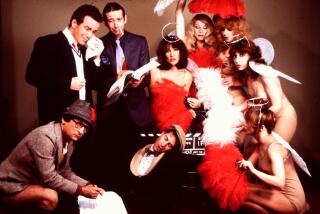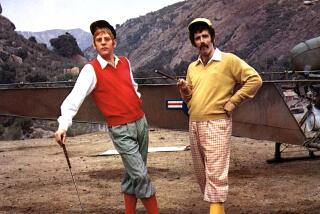AN APPRECIATION : Stella Adler: Last of Theater Dynasty
- Share via
With the death of Stella Adler early Monday comes the end of a theatrical age and dynasty. She was the surviving member of a generation of theater agitators--men and women--such as Harold Clurman (to whom she was briefly and tempestuously married) and Lee Strasberg (whose acting theories she did not espouse) and her own brother Luther Adler (who with the others and Stella was a founding member of the influential Group Theater of the 1930s)--for whom theater was as much a political as a personal statement.
My only real contact with this striking and elegant woman came in the course of a 1977 interview, on the publication of a book by Luella Rosenfeld about her famous father, the great Yiddish actor Jacob Adler, and at a time when she herself was contemplating spending more of her time in Southern California instead of doing what she had been doing until then: dividing her time between master classes in New York and master classes in Los Angeles.
It was already late in her life, but you would never have known it by her demeanor or comportment. Stella Adler was not an accommodating person. She was self-assurance itself. She didn’t walk into a room, she swept into one. Her green eyes flashed with intelligence. Always dressed to the nines, her exterior allure reflected the determined core of the supreme and unquestioned acting guru, always surrounded--borne aloft as it were--by a retinue of disciples.
But this was not just a pose. Her ideas about art and life were clear, energetic, empowering and unequivocally articulated. She loved to jostle people’s expectations and did so with great regularity. She could be very hard on the actors and aspiring actors who populated her classes. Her imperiousness turned as many people off as it did on, but it would be difficult to find any who did not come away with a potent and lasting impression.
This was not a theater class for the timid, even though it was taught by a woman who had had a remarkably brief acting career of her own and not a particularly distinguished one. She did most of her acting with the Group Theater and later appeared unremarkably in a few motion pictures. Like Clurman, whose own unconventional approach to teaching--though entirely different--was just as forceful and as full of pizazz, her best role was the one that she played every day at inventing herself.
(Their marriage, by all accounts, was made in hell as much as it was in heaven, and stories abound about that relationship, both real and apocryphal.) Teaching became her metier, and since she had been born into the great acting family of Jacob and Sara Adler, who had been pillars of the Yiddish theater, the sense of what acting should be was engraved in her DNA.
So was her natural flamboyance, nurtured in a home environment where strong ideas thrived and strong beliefs about socialism and trade unionism played a far more significant role than religion. “We were raised on the literature of the world,” she told this interviewer, adding that when you see your parents do Tolstoi’s “Power of Darkness,” school pales by comparison.
It was this ingrained elitist pursuit of high ideals that made her so valuable to students. She took pride in calling herself a snob. As in life, she favored the large theatrical gesture and--always maintaining that you cannot teach acting, that you can only stimulate what’s there--Stella Adler taught as much by example as by divine right: as a grandly self-conceived individual whose particular heritage, knowledge, willfulness and sheer chutzpah combined to light a few fires for others in the darkness.
More to Read
The biggest entertainment stories
Get our big stories about Hollywood, film, television, music, arts, culture and more right in your inbox as soon as they publish.
You may occasionally receive promotional content from the Los Angeles Times.










